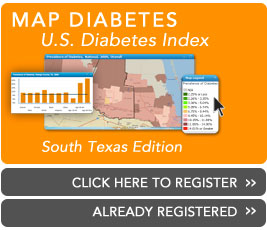Posted by Staff
Minority Diabetes Reports
Wednesday, November 28th, 2012
Science Salsa: Nov. 14, 2012
November 14th was world diabetes day, a day to mark on your calendar!
Diabetes complications drastically affect your quality of life and cut your life expectancy. Some risk factors such as age and ethnicity are unavoidable, but type 2 diabetes is often preventable and can be treated by changing what you eat and by exercising more.
This advice is well-known, but the number of new patients is not decreasing. More than 371 million people have diabetes worldwide, and the number of people with diabetes is increasing in every country. In the US, the Latino population has experienced an increasing percentage of people diagnosed with diabetes; from 6.3% in 1997 to 9.3% in 2010 (CDC age-adjusted data). Hispanics are hit harder than other populations in the US.The Office of Minority Health reported that: “Mexican Americans are almost twice as likely asnon-Hispanic whites to be diagnosed with diabetes by a physician. Read more
Posted by Staff
Minority Diabetes Reports
Wednesday, November 28th, 2012
ADA: August 24, 2012
Several studies have identified nearly 40 different type 2 diabetes susceptibility loci, mainly in European populations, but few of them have been evaluated in the Mexican population. The aim of this study was to examine the extent to which 24 common genetic variants previously associated with type 2 diabetes are associated in Mexican Mestizos. Twenty-four single nucleotide polymorphisms (SNPs) in or near genes (KCNJ11, PPARG, TCF7L2, SLC30A8, HHEX, CDKN2A/2B, CDKAL1, IGF2BP2, ARHGEF11, JAZF1, CDC123/CAMK1D, FTO, TSPAN8/LGR5, KCNQ1, THADA, ADAMTS9, NOTCH2, NXPH1, RORA, UBQLNL, and RALGPS2) were genotyped in Mexican Mestizos. Read more
Posted by Staff
Clinical Trials
Wednesday, November 28th, 2012
A systematic review and meta-analysis of behavioral interventions
Diabetes Care: December 1, 2012
OBJECTIVE Behavioral interventions targeting “free-living” physical activity (PA) and exercise that produce long-term glycemic control in adults with type 2 diabetes are warranted. However, little is known about how clinical teams should support adults with type 2 diabetes to achieve and sustain a physically active lifestyle.
RESEARCH DESIGN AND METHODS We conducted a systematic review of randomized controlled trials (RCTs) (published up to January 2012) to establish the effect of behavioral interventions (compared with usual care) on free-living PA/exercise, HbA1c, and BMI in adults with type 2 diabetes. Study characteristics, methodological quality, practical strategies for increasing PA/exercise (taxonomy of behavior change techniques), and treatment fidelity strategies were captured using a data extraction form. Read more
Posted by Staff
Clinical Trials
Wednesday, November 28th, 2012
Meta-analysis of randomized controlled trials
Diabetes Care: December 1, 2012
OBJECTIVE We compared the effect of insulin lispro protamine suspension (ILPS) with that of insulin glargine and insulin detemir, all given as basal supplementation, in the treatment of patients with type 2 diabetes.
RESEARCH DESIGN AND METHODS We conducted an electronic search until February 2012, including online registries of ongoing trials and abstract books. All randomized controlled trials comparing ILPS with insulin glargine or detemir with a duration of ≥12 weeks were included. Read more
Posted by Staff
Clinical Trials
Wednesday, November 28th, 2012
JCEM: November 21, 2012
Childhood obesity is increasingly associated with type 2 diabetes (T2D). Metformin reduces the risk for T2D in adult obese nondiabetic patients, but the evidence in obese children and young people is inconclusive.
Objective: The objective of the study was to assess the effect of metformin on body mass index SD score (BMI-SDS), metabolic risk factors, and adipokines.
Design: This was a prospective, randomized, double-blind, placebo-controlled trial.
Setting: The study was conducted at six pediatric endocrine centers in the United Kingdom.
Participants: One hundred fifty-one obese children and young people with hyperinsulinemia and/or impaired fasting glucose or impaired glucose tolerance (metformin: 74, placebo: 77). The study was comprised of 67.5% females, 65.6% postpubertal individuals, and 23.8% British Asian or Afro-Caribbean participants. The age range was 8–18 yr, the mean age was 13.7 (SD 2.3) yr, and the mean BMI-SDS was +3.4 (SD 0.5). Read more
Posted by Staff
Clinical Trials
Wednesday, November 28th, 2012
Diabetes Care: November 19, 2012
OBJECTIVE To characterize glucose response patterns of people who wore a real-time continuous glucose monitor (RT-CGM) as an intervention to improve glycemic control. Participants had type 2 diabetes, were not taking prandial insulin, and interpreted the RT-CGM data independently.
RESEARCH DESIGN AND METHODS Data were from the first 12 weeks of a 52-week, prospective, randomized trial comparing RT-CGM (n = 50) with self-monitoring of blood glucose (n = 50). RT-CGM was used in 8 of the first 12 weeks. A1C was collected at baseline and quarterly. This analysis included 45 participants who wore the RT-CGM ≥4 weeks. Analyses examined the RT-CGM data for common response patterns—a novel approach in this area of research. It then used multilevel models for longitudinal data, regression, and nonparametric methods to compare the patterns of A1C, mean glucose, glycemic variability, and views per day of the RT-CGM device. Read More
Posted by Staff
Clinical Trials
Wednesday, November 28th, 2012
Phrma: 11/26/12
Many times, we have written in this space about clinical trials of new medicines and how they are beneficial not only to patients, but also the economy and the advancement of science and patient care.
But it’s time to play a little catch-up and focus on a specific clinical trial, its key clinician and his institution to personalize the story. And since November is National Diabetes Month, we’ll profile a diabetes medicine trial:
Meharry Medical College in Nashville is one of the sites involved in a national research study of a new treatment that could lower blood sugar and prevent heart attacks and strokes in patients with Type 2 diabetes. The trial is being conducted in collaboration with the biopharmaceutical company Sanofi. Read more



























